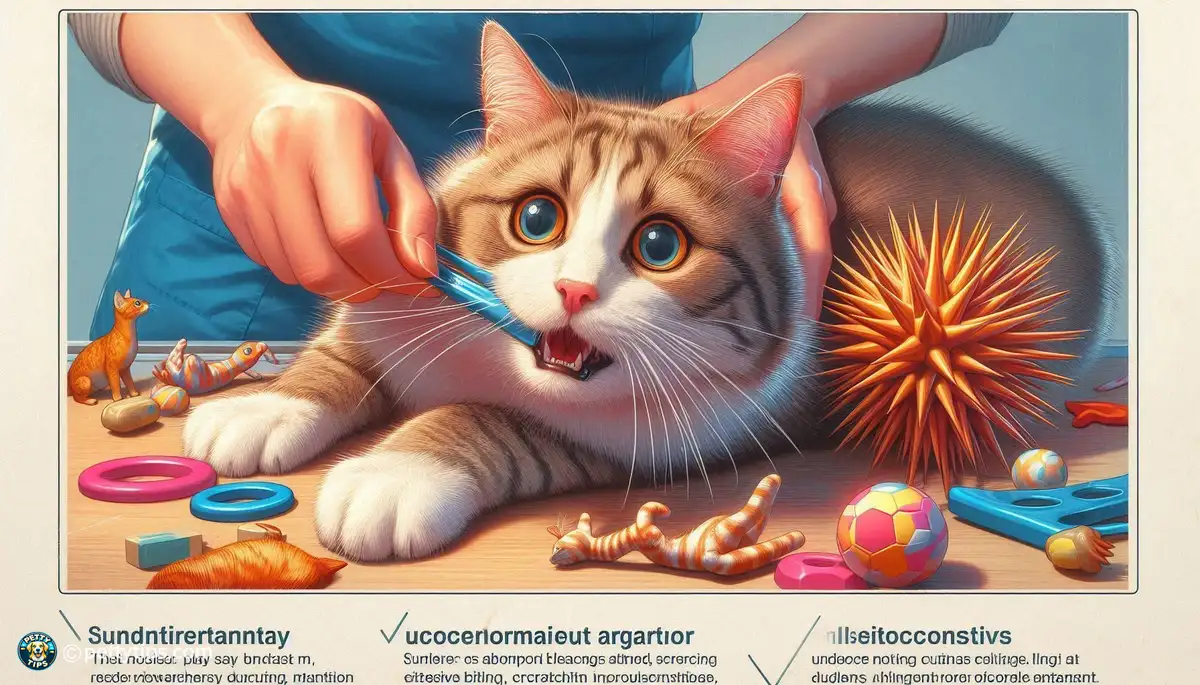
Can Cats Experience Insomnia? Causes and Solutions
Fabrizio Ferretti - Oct 12, 2024 - 6 min read


Understanding what constitutes normal play behavior in cats is crucial for identifying any deviations. Cats are known for their playful nature, often engaging in activities such as pouncing, chasing, and batting at toys or objects. Normal play behavior usually involves bursts of energy followed by periods of rest. However, when these behaviors become excessive, aggressive, or destructive, it may indicate underlying issues.
Cats communicate a lot through their body language, especially during play. While some behaviors may seem harmless, they can serve as subtle indicators of underlying problems. Pay attention to changes in your cat's posture, vocalizations, and overall demeanor during play sessions. Excessive vocalizations, such as growling or hissing, may signal discomfort or frustration, while tense body language could indicate fear or aggression.
It's common for cats to have favorite toys that they enjoy playing with regularly. However, if your cat becomes overly fixated on a particular toy to the exclusion of all others, it could be a sign of abnormal behavior. Cats may exhibit obsessive behavior towards toys due to stress, anxiety, or underlying medical issues. Keep an eye out for signs of compulsive behavior, such as repetitive actions or an inability to stop playing even when tired.
Playtime should be an enjoyable experience for both you and your cat. However, if your cat starts avoiding play sessions altogether or becomes aggressive during play, it could indicate a problem. Cats may avoid play due to illness, injury, or stress, while aggression during play could be a sign of fear, territorial behavior, or overstimulation. Monitor your cat's behavior closely and seek veterinary advice if you notice any concerning changes.
While it's normal for cats to vocalize during play, excessive or unusual vocalizations may indicate underlying issues. Pay attention to the types of sounds your cat makes during playtime. While some vocalizations, such as chirping or chattering, are harmless and often indicate excitement, others, such as prolonged growling or yowling, could signal distress or discomfort.
Cats are natural hunters and may engage in playful behaviors that mimic hunting instincts, such as pouncing and batting at toys. However, if your cat's play becomes overly destructive, it could be a cause for concern. Excessive scratching, biting, or clawing at furniture, walls, or other objects may indicate pent-up energy, frustration, or anxiety. Providing appropriate outlets for your cat's energy through interactive toys and regular play sessions can help redirect destructive behaviors.
Changes in appetite or sleep patterns can be indicative of underlying health issues or stress. While it's normal for cats to have fluctuations in their appetite and sleep habits, significant changes that coincide with alterations in play behavior may warrant further investigation. Loss of appetite or excessive sleeping could be signs of illness or discomfort, while sudden hyperactivity or restlessness may indicate anxiety or overstimulation.
Cats are social animals that typically enjoy interacting with their human companions and fellow pets. However, if your cat begins to exhibit signs of self-isolation or lethargy, it may be a cause for concern. Cats may withdraw from social interactions or become lethargic due to stress, illness, or underlying medical conditions. Pay attention to any changes in your cat's behavior and consult with your veterinarian if you notice prolonged periods of isolation or lethargy.
If you notice any signs of abnormal play behavior in your cat, it's essential to seek professional advice from a veterinarian. Veterinary professionals have the expertise to assess your cat's overall health and behavior and can help determine the underlying cause of any abnormalities. Schedule a thorough physical examination for your cat and be prepared to provide detailed information about their behavior, including any recent changes or unusual symptoms.
In some cases, abnormal play behavior in cats may require behavioral assessment and modification techniques. A certified animal behaviorist or feline behavior specialist can work with you to develop a customized behavior modification plan tailored to your cat's specific needs. This may involve implementing changes to your cat's environment, routines, and interactions to address underlying issues and promote healthier play behaviors.
Providing adequate environmental enrichment and mental stimulation is essential for promoting healthy play behaviors in cats. Ensure that your cat has access to a variety of toys, scratching posts, climbing structures, and interactive play sessions to keep them mentally and physically engaged. Rotate toys regularly to prevent boredom and offer opportunities for exploration and sensory stimulation to satisfy your cat's natural instincts.
Creating a safe and supportive environment is key to helping your cat thrive and exhibit normal play behaviors. Minimize sources of stress and anxiety in your cat's environment, such as loud noises, conflicts with other pets, or changes in routine. Provide plenty of opportunities for positive reinforcement and affectionate interactions to build trust and strengthen your bond with your cat. With patience, understanding, and professional guidance, you can help your cat overcome any challenges and enjoy a happy, fulfilling life.